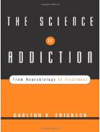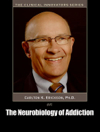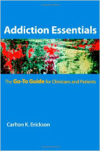
Director of the Addiction Science Research and Education Center at the University of Texas
The most up to date, state of the Science of Addiction content available View Here

The Science of Addiction: From Neurobiology to Treatment
A comprehensive overview of the neurobiology behind addictions. Neuroscience is clarifying the causes of compulsive alcohol and drug use while also shedding light on what addiction is, what it is not, and how it can best be treated in exciting and innovative ways. Current neurobiological research complements and enhances the approaches to addiction traditionally taken in social work and psychology. However, this important research is generally not presented in a forthright, jargon-free way that clearly illustrates its relevance to addiction professionals. The Science of Addiction presents a comprehensive overview of the roles that brain function and genetics play in addiction. It explains in an easy-to-understand way changes in the terminology and characterization of addiction that are emerging based upon new neurobiological research.
The author goes on to describe the neuroanatomy and function of brain reward sites, and the genetics of alcohol and other drug dependence. Chapters on the basic pharmacology of stimulants and depressants, alcohol, and other drugs illustrate the specific and unique ways in which the brain and the central nervous system interact with, and are affected by, each of these substances Erickson discusses current and emerging treatments for chemical dependence, and how neuroscience helps us understand the way they work. The intent is to encourage an understanding of the body-mind connection. The busy clinical practitioner will find the chapter on how to read and interpret new research findings on the neurobiological basis of addiction useful and illuminating. This book will help the almost 21.6 million Americans, and millions more worldwide, who abuse or are dependent on drugs by teaching their caregivers (or them) about the latest addiction science research. It is also intended to help addiction professionals understand the foundations and applications of neuroscience, so that they will be able to better empathize with their patients and apply the science to principles of treatment.

Neurobiology of Addiction: A New Perspective Curriculum with DVD
Dr. Carlton Erickson writes not only a “brain science 101” text, but helps explain how developments in neurobiology call for basic changes in the very ways that addiction professionals discuss, define, and treat chemical dependence. In an easy-to-understand language, Dr. Erickson renders the complex neuroscience of dependence in a clear and refreshing approach to facilitate understanding and use in treatment and recovery. This guide brings the hidden world of neurotransmitters, axons, receptors, vesicles, synapses, and neuroscience to light as an educational tool for clinicians to use with their clients.

Addiction Essentials
An up-to-date guide to the causes, diagnosis, and treatment of addictions.
Whether it’s to caffeine, nicotine, or alcohol, many of us suffer from at least one addiction. Carlton K. Erickson presents a comprehensive overview of the various types of addictions—covering both substance and nonsubstance addictions such as gambling, Internet use, and video games—and their diagnosis and treatment. This book sheds light upon the biological and environmental factors that cause addiction, reviews the various types of substance and nonsubstance addictions, and offers clinicians and patients hope for recovery.
Erickson examines alcohol, drugs that speed us up, drugs that slow us down, and how to recognize addictive behavior—such as exercise and videogame addiction—which may be less obvious. Other topics covered include alcohol and other drug pharmacology, neurophysiology of brain pathways, alcohol and drug interactions, adolescent drug use, drug use differences by gender and culture, and visual signs of drug use. Erickson presents various therapeutic methods for addressing addiction, including pharmacological interventions, individual or group therapy, twelve-step programs, and therapy involving family members. Finally, he reflects on the involvement of family and the risks and consequences of relapse.
Written by one of the country’s leading addiction specialists, this accessible, comprehensive book, is a go-to reference for your questions about addiction, and a friendly introduction to the diagnosis and treatment options.



